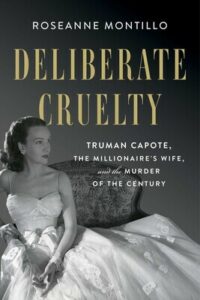
![]()
Deliberate Cruelty: Truman Capote, the Millionaire’s Wife, and the Murder of the Century
Roseanne Montillo
“And the violence that caused the death of Billy Woodward would, as recounted by Truman Capote in 1975, incite fresh violence that would ultimately destroy them both.”
When wealthy socialite Ann Woodward shoots her husband Billy in 1955, New York society is scandalized. 20 years later, still nursing a grudge from his encounter with Ann, author Truman Capote releases a chapter of the book he believes will expose her as a murderer. Both were small town dreamers, outsiders obsessed with becoming part of the “in” crowd — and both their climbs would reach an abrupt end with a single scandalous choice.
While I knew the story of Ann Woodward and the death of her husband Billy under suspicious circumstances, as well as of Truman Capote’s reputation for being a spiteful jerk, I didn’t know about their connection and similarities until I picked up Deliberate Cruelty. They both clawed their way up from nothing, overcoming poverty and difficult family lives to reach fame and fortune — Woodward through marriage, Capote through his social acumen. And though they both suffered terrible fates, my sympathies are with her more than him.
Pick this up if you like true crime, history, and enjoy learning about surprising connections.
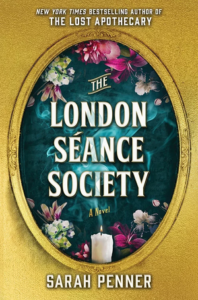
![]()
The London Séance Society
Sarah Penner
“Something cannot be an illusion if it still exists after we think it has gone.”
Lenna Wickes came to Paris in search of the truth of her sister’s death — she did not expect to become the student of the world’s premier medium. When Vaudeline D’Allaire is called to London to identify a killer, the two women find themselves embroiled in a mission far more dangerous than they could have imagined.
Sometimes you just need a murder mystery. Penner’s book was a fun, spooky read with just enough twists to keep me on my toes. The female characters were smart and quick, and I enjoyed seeing Lenna’s skepticism and Vaudeline’s belief butting heads. Also — surprise — it’s not a series (although I wouldn’t be mad if Penner wrote just one more).
Read this if you like the intersection of Victorian history and the supernatural, women being badasses, and are interested in something other than male-female romances.
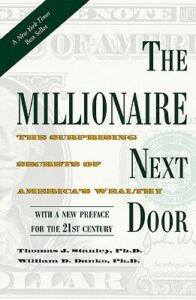
![]()
The Millionaire Next Door: The Surprising Secrets of America’s Wealthy
Thomas J. Stanley, Ph.D., William D. Danko, Ph.D.
DNF
“Wealth is more often the result of a lifestyle of hard work, perseverance, planning, and, most of all, self-discipline.”
If you’re a millionaire in the United States, chances are you exhibit a handful of characteristics that set you apart from everyone else…and it might not be what you think.
I love a personal finance book — and in this case I think that may be the reason I didn’t finish this one. The principles Stanley and Danko cover are sound, but most fall into the “well, duh” category. Yea, you should spend less than you make, have/track a budget, invest/save, etc. Other items about not supporting lazy adult children and choosing to be an entrepreneur are more niche and obviously don’t apply to everyone. Originally published in 1996 and last updated almost 15 years ago, the book is dated numbers-wise (hello pandemic inflation) and when it comes to acknowledging things like privilege (whether gender, race, level of health, etc.).
I wouldn’t call this book bad, but there are newer titles that provide similar information set in a more recent context.
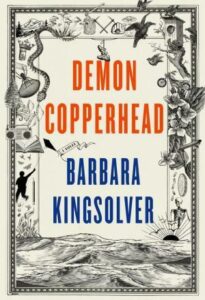
![]()
Demon Copperhead
Barbara Kingsolver
Book club
“Where does the road to ruin start? That’s the point of getting all this down, I’m told. To get the handle on some choice you made. Or was made for you.”
Ancient superstition says that a child born still in the amniotic sac will never drown — but that doesn’t mean there’s not a thousand other ways that kid can suffer. Surrounded by drug addiction and abuse and subject to corrupt systems, it’s a wonder anyone makes it out alive. Like those before him, the child known as Demon Copperhead must rely on his community and his own inner strength to avoid obliteration.
I feel the same way after reading this book as I did almost 20 years ago after reading The Poisonwood Bible in high school: wrung out, wrecked, and exhilarated. Kingsolver is a phenomenal storyteller, and in Demon Copperhead she explores old themes in new ways that prove not much has changed about how we treat those considered “less than.” It’s an unflinching look at the challenges faced by rural Appalachians for hundreds of years. The only reason I don’t consider it a five-star read is because I’ve always had a hard time with the stream-of-consciousness writing style — it makes it difficult for me to understand what’s plot/important and what’s just the “filler” that comes with the style. All in all, though, I found this book beautiful and heartbreaking and important.
This book is perfect for you if you already like Kingsolver’s work, and if you’re ready for a slow burn read that shares some uncomfortable truths.
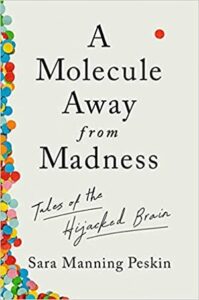
![]()
A Molecule Away from Madness: Tales of the Hijacked Brain
Sara Manning Peskin
“Tales of guerilla warfare have fascinated humans for millennia, but few of us realize that our brains are engaged every day in the same genre of conflict. We are forever surviving on the brink, battling molecules that can destroy our minds.”
Molecules (groups of atoms bound together) are so small that they can only be seen with the most powerful microscopes; yet scientists have spent countless decades studying the drastic effects caused by these tiniest of building blocks. As we race toward ever more impressive scientific discoveries, will we ever be able to fully understand the humble molecule?
Nothing will keep you awake at night quite like the knowledge that at literally any second, your brain could start (or stop!) manufacturing specific clumps of cells that change your personality, convince you it’s the zombie apocalypse, or make you lose control of your body. But if you can muscle past the fear response and get curious, this book is fascinating. Whether it’s the diseases you think you know or something new but equally horrifying, Peskin covers it — all in a voice that nicely balances scientific detail with human stories.
Give this a try if you like “neuroscience lite” and are okay with not trusting your brain for a few days.
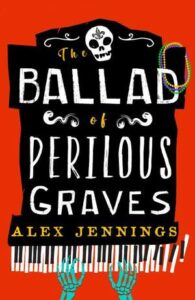
![]()
The Ballad of Perilous Graves
Alex Jennings
DNF
“The night beyond the stream of [fan] air was hot and close—like dog breath, but without the smell. As soon as Perry left the breeze, dancing to the edge of the porch steps, little beads of sweat sprang out on his forehead and started running down.”
In an alternate reality, the city of New Orleans is even more magical than its real-life counterpart. Sky trolleys and dead cabbies keep the city moving, magicians start school young, and Wise Women speak words of power. But something is wrong with Nola; nine songs of power have been taken, and without them the city is doomed. It’s up to Perilous Graves and his sister Brendy to recover them.
I picked this book up more than a year ago as I prepped for a trip to New Orleans, hoping the vibes would get me even more excited for my journey. When I couldn’t get interested in the story or characters I assumed it was because I was too distracted with life, trip planning, etc., but it felt like it had promise so I figured I’d give it another try someday. After picking it up again this month and getting about 100 pages in (again), I’m calling it a DNF. I’m all for a book that drops you in and expects you to figure stuff out, but this one didn’t give me enough solid clues to help me put it all together. It always seemed like the thing that would hook me would show up on the next page or the next chapter, but I just didn’t have the energy to get through all 453 pages.
Read if you love New Orleans, alternate reality, and don’t mind a lot of guesswork when it comes to plot and purpose.
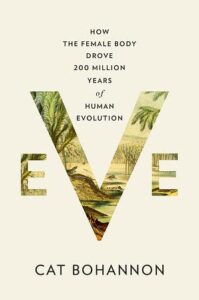
![]()
Eve: How the Female Body Drove 200 Years of Human Evolution
Cat Bohannon
“Modern medicine, neurobiology, paleoanthropology, even evolutionary biology all take a hit when we ignore the fact that half of us have breasts. So it’s time we talk about breasts. Breasts, and blood, and fat, and vaginas, and wombs—all of it. How they came to be and how we live with them now, no matter how weird or hilarious the truth is.”
For a species that obsesses over the female body, we sure don’t seem to know a lot about it. Why do women live longer? Why are they more likely to get Alzheimer’s? Is there an evolutionary advantage to things like live birth, menopause, and even sexism? Eve is a deep, funny, and fascinating dive into the science and history behind nine characteristics that we think of as human, but might more accurately be described as uniquely female.
I don’t know how I managed to keep reading this while also constantly picking my jaw up off the floor. The human body is a fascinating thing, especially when that body can grow, give birth to, feed, and raise a tiny version of itself. I appreciated Bohannon’s more egalitarian look at evolutionary biology/psychology, and her chapters on menopause and love were so damn cool. The only reason it’s not a five-star read is that it’s kind of an overwhelming amount of information — I had to reach some sections a couple times before I felt like I understood. But I guess that means I get to enjoy reading it again?
If you like science, history, women’s studies, and the occasional sassy footnote, this book may be your next great read.
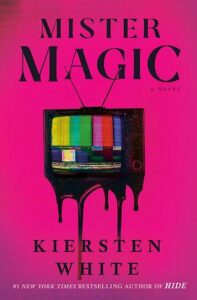
![]()
Mister Magic
Kiersten White
“Clean hearts and clean minds, cleanliness at all times! Nothing dirty, nothing bad, always happy, never sad!”
Decades after the show was shut down, the last members of the Mister Magic circle have reunited to share their experiences for a podcast. The trouble is that despite everyone’s collective memories of the show there are no recordings, no known director or producers, and no one can agree what Mister Magic himself looked like. The cast’s memories are buried, and digging them up is more risky than imagined. Who — or what — has brought them together again, and why?
A tough end to my reading month. I dislike unreliable narrators, especially when they’re unreliable due to memory loss; yet even though I knew as little as the narrator, I could still see the main portion of the ending coming a mile away. Everything felt heavy-handed, which gave me The Lion, the Witch and the Wardrobe vibes (Did you know the lion is supposed to represent Jesus? Did you?!). It seemed like the author is working through some Big Feelings about the themes, and by the end it felt I was being lectured at instead of discovering the truth about what happened.
Add this to your TBR if you like unreliable characters and mysteries that don’t show much until the very end.
Photo by Roven Images on Unsplash






